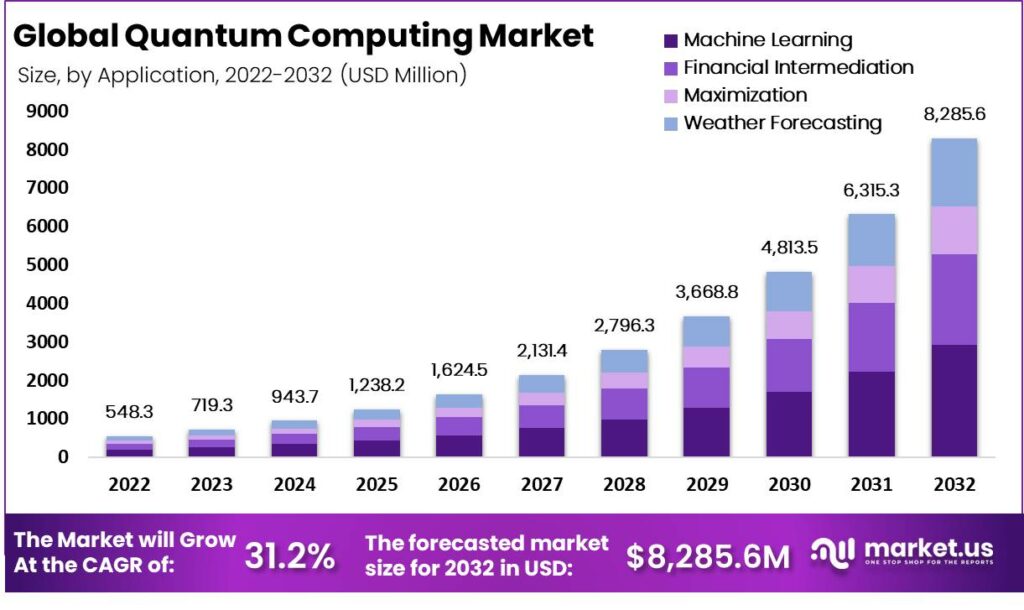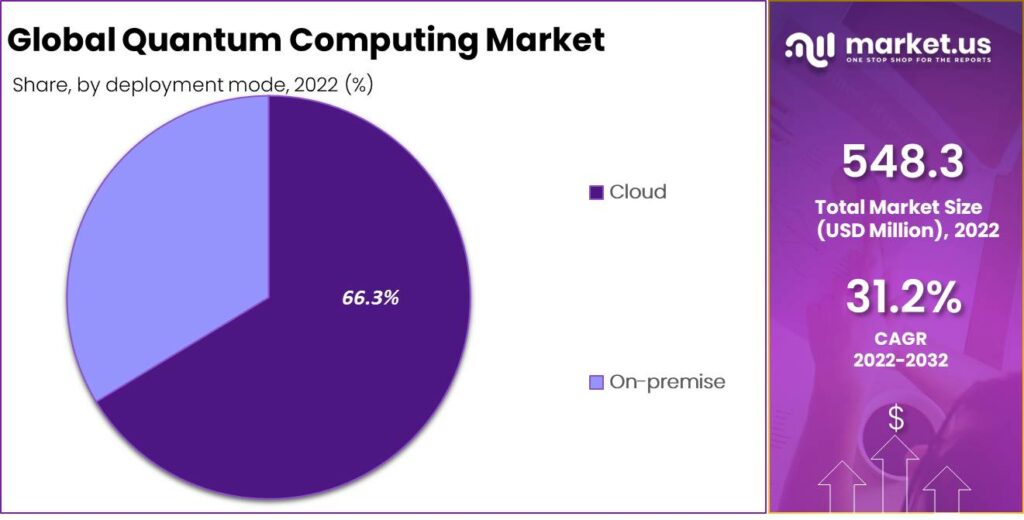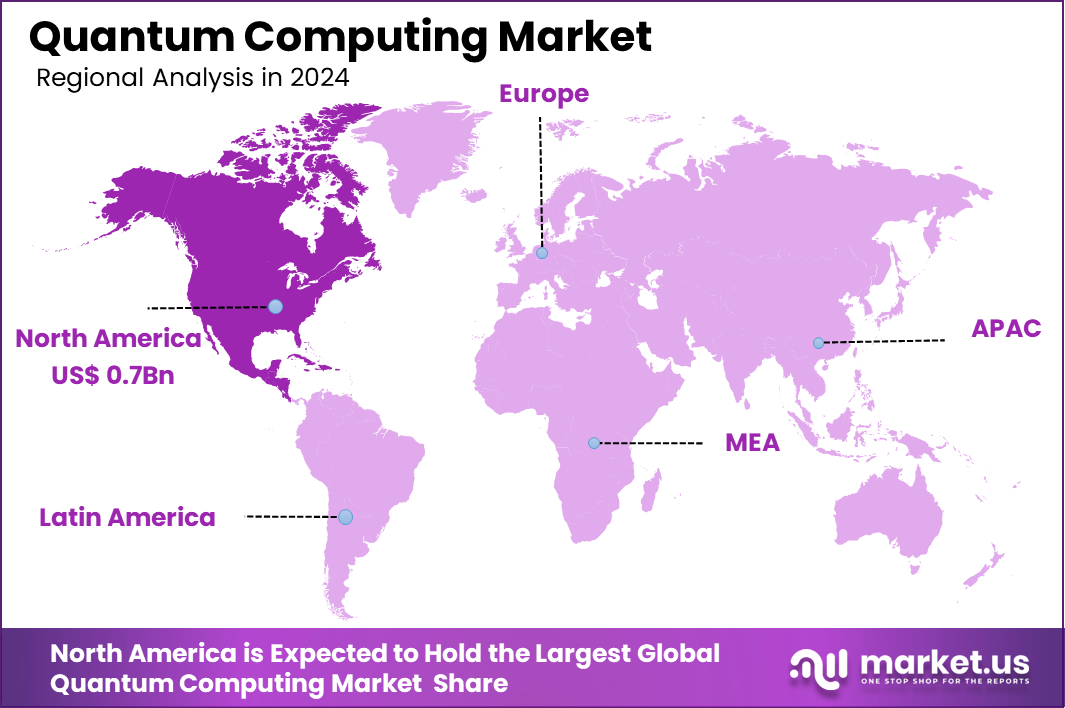New York, Jan. 11, 2024 (GLOBE NEWSWIRE) -- According to Market.us, The global quantum computing market is likely to jump from USD 943.7 million in 2024 to USD 8,285.6 million by 2032. This projected expansion is anticipated to result from an average 31.2% CAGR in the demand for the quantum computing industry over the upcoming decade.
Quantum computing is an emerging technology that leverages the principles of quantum physics to solve complex computational problems beyond the reach of classical computers. It relies on quantum bits or qubits to perform calculations and can process exponentially more data compared to binary bits used in regular computers.
The quantum computing market has been experiencing rapid growth and attracting significant attention from both the scientific community and the business world. While still in its early stages, the potential applications of quantum computing span various industries, including pharmaceuticals, finance, logistics, cryptography, and optimization problems.
Get PDF Sample for Technological Breakthroughs@ https://market.us/report/quantum-computing-market/request-sample/

Key Takeaways
- In 2022, the Global Quantum Computing Market was valued at USD 548.3 Million and is expected to reach USD 8,285.6 Million by 2032, with a remarkable Compound Annual Growth Rate (CAGR) of 31.2% between 2023 and 2032.
- The growth of the quantum computing market is driven by the adoption of quantum computing technology and advancements in quantum hardware components.
- Machine learning is the leading application, fueled by its role in error correction, system features, and quantum algorithm development.
- Cloud-based quantum computing exhibits the highest growth rate, providing accessible solutions through simulators and processors.
- Services dominate the market due to the demand for quantum computing proficiency, while investments in quantum computing systems are on the rise.
- The banking sector extensively utilizes quantum computing for financial algorithms, while community care benefits from healthcare data analysis.
- North America and Europe lead the market, driven by rapid cloud adoption and digital government initiatives.
- IBM, Google Quantum AI, Microsoft, and Amazon Web Services play significant roles in advancing quantum computing through technological advancements and partnerships.
Factors Affecting the Growth of the Quantum Computing Market
- Technological Advancements: Advancements in quantum hardware, such as qubit stability, coherence time, and error correction techniques, are crucial for the growth of the quantum computing market. As researchers and engineers make progress in developing more reliable and scalable quantum computing systems, it opens up new possibilities for practical applications and attracts investments from both public and private sectors.
- Research and Development Investments: Government funding, private investments, and collaborations between academic institutions and industry players are essential for driving research and development in the field of quantum computing. Increased funding leads to accelerated progress in areas such as qubit development, quantum algorithms, and quantum software tools. These investments contribute to the growth of the market by fostering innovation and pushing the boundaries of what is possible in quantum computing.
- Industry Adoption and Applications: The adoption of quantum computing by industries across various sectors is a crucial factor for market growth. As companies recognize the potential benefits and competitive advantage that quantum computing can provide, they are investing in research, pilot projects, and partnerships to explore its applications. Industries such as finance, pharmaceuticals, logistics, and cryptography are among those actively exploring the use of quantum computing to solve complex problems and optimize processes.
- Quantum-Safe Cryptography: The rise of quantum computing also creates a need for quantum-safe cryptographic solutions. The potential threat that quantum computers pose to current encryption algorithms has driven the demand for post-quantum cryptography and quantum-resistant encryption methods.
Report Segmentation
Based on Application
In 2023, the machine learning segment held a dominant position in the quantum computing market, capturing a significant share. This prominence is primarily due to the unparalleled computational power of quantum computers, which can process and analyze vast datasets far more efficiently than classical computers. Machine learning, a field that relies heavily on the analysis and interpretation of large data sets to make predictions or decisions, is thus one of the most promising applications for quantum technology.
Based on the Deployment mode
In 2023, the cloud segment held a dominant market position in the quantum computing market, capturing a substantial share. This dominance is largely driven by the flexibility, scalability, and accessibility that cloud-based quantum computing offers. Unlike traditional on-premise setups that require significant infrastructure and investment, cloud platforms allow users to access quantum computing resources over the internet, making this revolutionary technology accessible to a broader range of users and industries.

Based on Offering
In 2023, within the quantum computing market, both the Services and Systems segments held dominant positions, each capturing a significant share. The Services segment, in particular, has seen rapid growth due to the increasing need for expertise and support in integrating quantum computing into existing technological infrastructures. As quantum computing is a complex and specialized field, businesses and research institutions often rely on external services for deployment, maintenance, and consulting. These services are crucial in helping organizations leverage quantum computing to its full potential, driving innovations and efficiencies across various applications.
Based on End-User
In 2023, the Banking segment held a dominant market position in the quantum computing market, capturing a significant share. This prominence is primarily due to the sector's urgent need for advanced computational capabilities to manage complex financial models, optimize trading strategies, and enhance security through quantum cryptography. The banking industry's large-scale data sets and the intricate nature of financial transactions make it an ideal candidate for the speed and power of quantum computing.
Regional Analysis
In 2023, North America held a dominant market position in the quantum computing sector, capturing more than a 31.3% share. This substantial market presence can be attributed to the region's robust technological infrastructure, significant investments in research and development, and the presence of leading quantum computing companies and academic institutions. The United States, in particular, has been at the forefront of quantum computing research, driven by both government funding and private sector innovation.

Competitive Landscape
The competitive landscape of the market has also been examined in this report. Some of the major players include:
- IBM Corporation
- Google Quantum AI
- Microsoft Corporation
- Amazon Web Services, Inc
- Atos Quantum
- D-Wave Quantum Inc.
- Intel
- Hitachi
- QC Ware
- Zapata Computing
- Toshiba Corporation
- Other Key Players
Scope of the Report
| Report Attributes | Details |
| Market Value (2023) | USD 719.3 Million |
| Forecast Revenue 2032 | USD 8,285.6 Million |
| CAGR (2023 to 2032) | 31.2% |
| North America Share | 31.3% |
| Base Year | 2023 |
| Historic Period | 2018 to 2022 |
| Forecast Year | 2023 to 2032 |
Driving Factors:
- Advancement in Computing Power: Quantum computers offer significantly higher processing speed and capacity compared to classical computers, making complex problem-solving in fields like cryptography, drug discovery, and traffic optimization more efficient.
- Increased Investment: Both public and private sectors are heavily investing in quantum computing research and development, recognizing its potential to revolutionize various industries.
- Rising Demand for Enhanced Cybersecurity: Quantum computing promises to deliver unbreakable encryption methods, driving demand from organizations looking to safeguard sensitive data against emerging cyber threats.
- Collaboration between Academia and Industry: Partnerships between educational institutions and tech companies are accelerating advancements and practical applications of quantum computing technologies.
Restraining Factors:
- Technological Complexity: The complexity and nascent stage of quantum technology make it challenging for many organizations to adopt and integrate into existing systems.
- High Initial Costs: The significant initial investment required for quantum computing infrastructure and research is a major barrier for many smaller enterprises.
- Lack of Skilled Professionals: There is a shortage of qualified quantum scientists and engineers to drive development and manage quantum systems.
- Quantum Decoherence: Maintaining the stability of qubits for practical and prolonged use is a significant technical challenge that impedes the progress of quantum computing.
Growth Opportunities:
- Expansion in Healthcare and Pharmaceuticals: Quantum computing has the potential to revolutionize drug discovery and personalized medicine by simulating molecular structures and biological processes with unprecedented precision.
- Advancements in Artificial Intelligence: Quantum computers can process and analyze large datasets much faster than classical computers, offering significant improvements in machine learning and AI capabilities.
- Optimization Solutions for Industries: From logistics and supply chain to energy management, quantum computing can solve complex optimization problems, offering efficiency improvements across various sectors.
- Government and Defense Applications: Quantum computing's potential for secure communications and strategic advantage in defense operations presents significant growth opportunities in the government sector.
Challenges:
- Error Rates and Stability: Quantum computers are highly susceptible to errors and loss of quantum coherence, which makes them unstable and unreliable for certain tasks.
- Lack of Universal Quantum Language: The absence of a standardized programming language for quantum computers hinders the development of widespread applications and user adoption.
- Quantum Supremacy Uncertainty: The exact point at which quantum computers will consistently outperform classical computers (quantum supremacy) is still uncertain, leading to hesitancy in investment and adoption.
- Ethical and Security Concerns: The potential for quantum computers to break current encryption methods raises significant security and ethical concerns that need to be addressed.
Key Market Trends:
- Hybrid Quantum-Classical Computing: The development of hybrid systems that combine classical and quantum computing is gaining traction, offering more stable and practical solutions for various applications.
- Quantum as a Service (QaaS): Cloud-based quantum computing services are becoming more prevalent, allowing more users to access and experiment with quantum computing power without the need for significant upfront investment.
- Focus on Quantum Algorithms: There's a growing focus on developing new algorithms specifically designed to take advantage of quantum computing's unique capabilities, opening up new possibilities across multiple fields.
- Global Quantum Collaboration: Increasing global cooperation in quantum research is leading to faster technological advancements and standardization in quantum computing, driving its market growth and maturity.
Key Market Segments
Based on Application
- Machine Learning
- Maximization
- Weather Forecasting
- Financial Intermediation
Based on the Deployment mode
- Cloud
- On-Premise
Based on Offering
- Services
- Systems
Based on End-User
- Transportation
- Defense
- Banking
- Community Care
- Cyber Security
- Other End-Users
Recent Developments
- In November 2022, Microsoft (US) introduced the Azure Quantum Resource Estimator, a tool designed to aid quantum algorithm developers in the creation and optimization of algorithms intended for future quantum computers.
Explore More Reports
- Chatbot Market size was valued at USD 6 billion in 2023 and is expected to reach USD 42 billion by 2032 with a CAGR of 23.91%.
- Edge computing market size is expected to be worth around USD 206 bn by 2032 from USD 40 billion in 2022, growing at a CAGR of 18.3%.
- Cyber Insurance Market is poised to reach USD 90.6 Bn by 2033, growing at a CAGR of 22.3% during forecast period 2023-2033.
- Cloud Gaming Market size is expected to be worth around USD 143.4 Billion by 2032 from USD 3.4 Billion in 2022, growing at a CAGR of 46.9%.
- Distributed Antenna System (DAS) Market size is expected to be worth around USD 5.5 Bn by 2033, growing at a CAGR of 7.6%.
- Identity and Access Management Market was valued at USD 14.7 Bn. Between 2023 and 2032, register the highest CAGR of 13.7%.
- Automation Identification System Market size is expected to be worth USD 491.0 Mn by 2032 from USD 278.2 Mn in 2023, at a CAGR of 6.0%
- Wearable Technology Market size is expected to be worth around USD 231 Billion by 2032 , growing at a CAGR of 14.60%.
- ERP Software Market size is expected to be worth around USD 136.1 Billion by 2032, growing at a CAGR of 10.5% during the forecast period.
- Field-Programmable Gate Array (FPGA) Market size is expected to reach USD 13.5 bn in 2032, at a CAGR of 7.8%.
- Generative AI in Fintech Market will exceed USD 6,256 million by 2032, rising from USD 865 million in 2022; at a CAGR of 22.5%.
- Generative AI in Marketing market is valued at USD 1.9 bn in 2022. With a CAGR of 28.6%, the market is set to reach US$ 22.1 bn by 2032.
- Generative AI in Gaming Market is predicted to reach a valuation of USD 7,105 Mn by 2032, registering highest CAGR of 23.3%.
- Generative AI in the Conference Market is expected to reach around USD 588.7 Mn by 2032; Rise at an astounding CAGR of 18.5%.
- Smart Airport market was valued at USD 15.9 Bn in 2022 and expected to reach USD 36.2 Bn by 2032; at a CAGR of 8.8%
- Smart Homes Market is expected to reach USD 503.1 billion, this market is estimated to register the highest CAGR of 16.8%
About Us
Market.US (Powered by Prudour Pvt Ltd) specializes in in-depth market research and analysis and has been proving its mettle as a consulting and customized market research company, apart from being a much sought-after syndicated market research report-providing firm. Market.US provides customization to suit any specific or unique requirement and tailor-makes reports as per request. We go beyond boundaries to take analytics, analysis, study, and outlook to newer heights and broader horizons.
Follow Us On LinkedIn Facebook Twitter
Our Blog:
